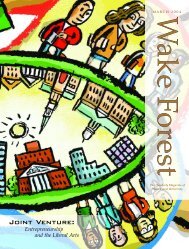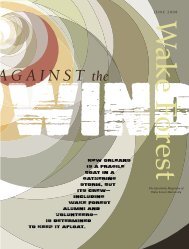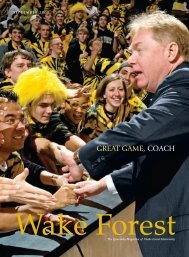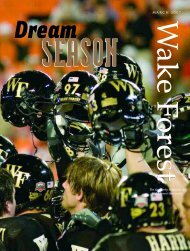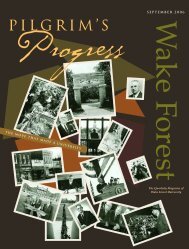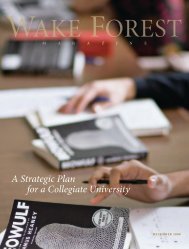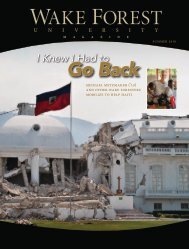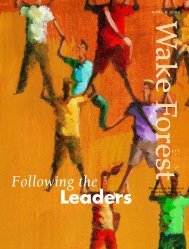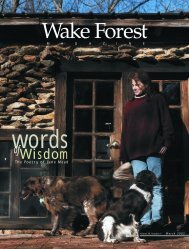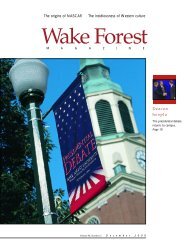The Internet is a fraternity test file to the “nth”degree. Need a paper comparing heroes in Virgil’sAeneid and Cervantes’ Don Quixote? For $59.10,www.150000papers.com will set you up. Prefer a papercustom-written on your topic by a Ph.D.? Send $15 perpage to www.worldclasstermpapers.com.One would expect that students of the caliber <strong>Wake</strong> <strong>Forest</strong>admits would be shocked to learn that a term paper is but acouple of clicks and a wad of cash away. Surely these buddingscholars have no such Web sites bookmarked on theirThinkPads. One would also expect that erudite faculty memberswould know at a glance if a pre-fab term paper crossedtheir desks. But the fact remains that the same technology thatputs a world of resources at the fingertips of students alsopresents a host of ethical quandaries.Perhaps <strong>Wake</strong> <strong>Forest</strong> students would not be so bold orlazy as to turn in a purchased term paper, but with the easeof cutting and pasting, might they insert a paragraph intotheir own writing and forget to cite the source? Might theyslip off to a Web site for help in the middle of an online quiz?Might they share a password for a University database withan off-campus friend?Many students may successfully navigate the above questionsbut yet fall victim to another action that disturbs facultymembers: doing all their research on the Internet andnever setting foot in the library.Faculty members, too, can find themselves on a slipperytechnological slope. Is it possible for weak teaching to get byunder the guise of glitzy PowerPoint presentations? Arescholars abdicating their responsibility to disseminate theirresearch by ignoring the power of the Internet? And whatabout communication via e-mail?In the eight years since ThinkPads first cropped up oncampus and <strong>Wake</strong> <strong>Forest</strong> became one of the most-wiredschools in the country, technological gizmos have becomestandard.The questions are anything but. How is the technologyaffecting the process of teaching and learning? Arestudents learning more or just staying more entertained?Will the accessibility to information turn students into betterresearchers or drain away their individual critical thinking skills?Students and faculty alike are finding themselves praisingthe positive powers of the Internet and yet feeling discomfortat the potential pitfalls.The ethical use of technology has lagged behind its power,said Paul Orser (’69), associate dean of the College and deanof freshmen. Orser addressed the misuse of computers inhis annual speech to incoming students last month. “Partof the misuse is simply wasting time, surfing around andcontacting people who don’t need to hear from them everytwo hours,” Orser said. “But the other part is when studentsdon’t take the time to be honest.They allow themselves tobe ratcheted into the last minute by making poor timechoices. So then the paper is due, and they’ve been out halfthe night, they make another bad choice.They turn to theInternet, they find a source, and they plagiarize it.”Every professor, Orser said, would prefer that such a studentconfess to having trouble with a paper and ask for help. Orserwants to see students take the time to ask themselves if theyare making a good decision. It would be much better to takean F than to be caught plagiarizing and face suspension, he said.“The technology itself is not at fault; it’s the handiness ofit.The failure is wrapped up in the rapidity of the access.Youcan’t browse the stacks in the library and plagiarize at 2 a.m.,but you can do that all night on the Internet.”For David Coates,Worrell Professor of Anglo-AmericanStudies in the Department of Political Science, the advantages ofthe Internet and the accompanying technology far outweigh thenegative possibilities. Coates came to <strong>Wake</strong> <strong>Forest</strong> four yearsago from the University of Manchester in the United Kingdom,where there was no computer system directly linking facultywith students, and students were still writing essays in longhand.“What is terrific about this system at <strong>Wake</strong> <strong>Forest</strong> is I canhave a one-to-one relationship with all my students,” Coatessaid. “I encourage them to e-mail me all the time with anysmall difficulty they have.That means we develop a rapport on aone-to-one basis.The technology changes and improves theteaching process enormously.”“The technology itselfis not at fault; it’sthe handiness of it. ”PAUL ORSER (’69)Ironically, the modern technology makes it possible toreturn to an ideal of the past, he said. “The way the computerevolution has gone in the past few years has really madeuniversity teaching of the old kind possible again with largergroups. In the old days, my sense is that there were a lot ofone-to-one long conversations between students and faculty, alot of talking. Now in this much busier time when the amountof academic material that we all have to absorb is much greater,where time is very precious, we still need the same care.”An advantage to using e-mail is that the student can keepthe note for future reference. “It manages to divorce the articulationof a problem by a student from my thinking andresponse to it. I have time to think about it and write back aclear and focused response.The quality of the exchange isimproved,” Coates said. “It’s recorded so they can look at itlater. If you have a conversation with a student, it may seemwonderfully clear to them while you’re talking and when theygo away suddenly it’s not so clear again.”22 <strong>Wake</strong> <strong>Forest</strong> <strong>Magazine</strong>
Coates sees the e-mail exchanges as an enhancement toface-to-face contact. He insists that each student come to hisoffice for a personal meeting at the beginning of the semesterand also meets with them individually to discuss their work.And while he’s big on e-mail, he’s not as interested in Power-Point presentations. “I remain rather committed to reactiveinteraction with my students and letting the conversation gowith their questions,” he said. “I’m still very much a chalk anddrawing man. I require students to use the library and thenupdate by going to the Web.”One of Coates’ students last semester wrote a paper onhow British Prime Minister Tony Blair ended up backingPresident Bush in Iraq. “She read all Blair’s speeches since 9/11.Before the Web, she would have had to wade through newspapersand it would have taken forever,” Coates said. “In my ownresearch, now that I am living away from the UK but stillresearching UK politics, I don’t feel I’m away. Doing contemporaryresearch has become much, much easier.The quality ofwhat’s being done has definitely gone up.”Elizabeth Gotha (’05), one of Coates’ students, has takenhis approach to combining library and Web-basedresearch.The junior political science major from Arcadia,California, still searches the library for books and other printeddocuments, saving the Internet for current articles and journals.She appreciates the fact that Internet searches can be done insmaller chunks of time than visiting the library but recognizesthat the Internet can be a very unwieldy tool.“It’s difficult to learn when reading off the computer.Whenyou have the physical, tangible paper and you have a pen, you’reactively reading and underlining.When you have it on thecomputer, it goes into this secondary memory where youdon’t really retain a lot of what you read,” Gotha said. “If wego to just technology and not using it in addition to books, ifwe just let it take over because it’s easier, we won’t have anywherenear the skills we have today. I’m sure we’ve lost researchskills with the Net, since we’re just relying on search engines.”Rhoda Channing, the late director of the Z. Smith ReynoldsLibrary, worried about exactly that problem. “Many studentsno longer use the library as their first step in finding information.Many use a search engine,” Channing said in an interviewbefore her death on July 25 (see related story page 9). “They findfifty articles on a topic and they eliminate any that are notavailable in full text online, much to the detriment of theireducation.They don’t want to have to come to the library toget it off the shelf.The pressure is on for more and more fulltext but there are many that are not available or only from acertain date forward. If you’re researching Jane Austen, therewas an awful lot written about her before the Internet.”Students still need the resources of the library, Channing said.“There is a much greater need for information literacy as opposedto computer literacy. Students are confronted by thousands of hits“I’m still very much a chalkand drawing man. I requirestudents to use the libraryand then update by going tothe Web.”DAVID COATESwhen they do a search in a search engine like Google.They needinstruction in how to evaluate the sources that they find,” shesaid. “With an interview with the reference librarian, you canrefine your search.That’s why we’re here.”To that end, the library staff is now offering nine sectionsof a course called “Accessing Information in the 21st Century.”Reference librarians are teaching students how to developresearch strategies, decide which search engine to use, determinethe words they should use in their search, and how todiscern credible sources on the Internet.Elizabeth Leonard, head of reference, helped teach a pilot forthe course last spring. “It’s not that students are any lazier thanthey ever were, it’s just that there is so much more informationavailable to them now,” she said. “Most students said they nevereven went past the second page of search results.We’re teachingthem how to dig deeper.”The course also discusses the process of scholarly researchand gives students tips such as setting in italics any materialthey cut and paste from a Web site so it will be obvious laterwhich work is not their own. “We teach them that they needto cite their sources not just to avoid getting into trouble butto acknowledge the people who came before them. Many studentssaid no one had ever told them why they should be socareful about citations,” Leonard said.That is not to say the librarians are not thrilled with theresearch capabilities the Internet provides.They love the easy<strong>September</strong> <strong>2003</strong> 23



